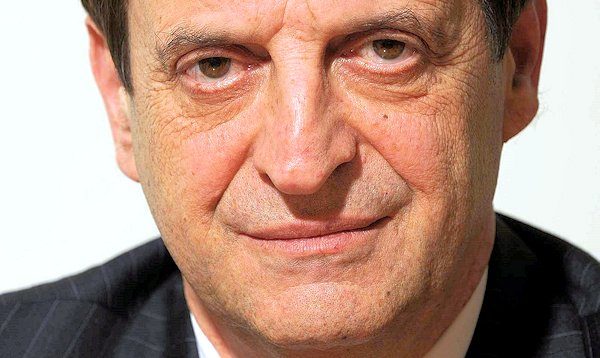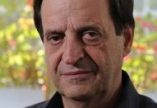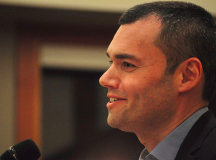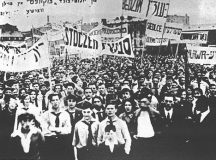Dan Meridor served at various times as the Israeli Deputy Prime Minister, Minister of Finance, Minister of Justice and Minister of Intelligence and Atomic Energy. In this recent public talk hosted by the Menachem Begin Heritage Centre he argued for Israel to reject populism and urgently renew the Jabotinsky-Begin tradition of liberal nationalism. ‘If you now speak of democracy, human rights, and the rule of law, you will be depicted as a “leftist”’ he said, ‘although these were the ideas and the words Menachem Begin fought for all his life, and Ze’ev Jabotinsky before him’.
Freedom and Liberty in Zionism
When Menachem Begin formed the Likud (Union in Hebrew) Party, its official name was the ‘National Liberal Movement’. For him that name was very important. It was the genetic code on which he built the Likud. It summed up his worldview, based on what he learned from the Revisionist thinker Ze’ev Jabotinsky. The basic philosophy of Zionism was based on the ‘freedom and liberty’ nationalism of the European movements in the 18th and 19th centuries.
Two freedoms must be balanced. Personal freedom: I was born free with inalienable natural rights: the state has no business to be involved in my affairs unless they show me why they should be. National freedom: my nation wants to be free, not subjugated to other nations. These two ideas gave birth to the ‘spring of nations’ in 1848 in Europe. Peoples like the Czechs, Hungarians and the Poles rose up to fight for independent nationhood.
The importance of a state to a people seeking national liberation was well understood by US President Wilson, when he spoke after the First World War of his ‘Fourteen Points’ and of the right of national self-determination. To be part of a culture, language, literature and environment, and to want to live in our ‘ways’, is very human. Not to understand this desire means not to understand humanity. Yes, we may be part of more than one group, but our national identity is quite important to all of us. Nation-states are built on this principle.
And yet, we do not accept that nation-states are only for the national majority. The idea of a state that has only has one people was the Nazi idea. Against that idea we liberal nationalists pit the idea of the rights of the individual and of minorities, for example the rights of Romanians living in Hungary, of Ukrainians living in Poland, and so on.
Zionism and the balancing of nationalism and liberalism
Zionism says the Jews are a nation and not just a religious group. It used to be that one spoke of ‘German Jews’, meaning that while we are Germans in our nationality, religiously we are Jews. Zionism opened up a new road: ‘You can be a member of the Jewish nation, and you can be so whether you are religious or not. You can be totally secular and fully Jewish’. Look at the most important leaders of Zionism, Theodore Herzl, Ze’ev Jabotinsky, David Ben-Gurion, and Chaim Weizmann. They were all fully secular and all fully Jewish. This was something new that Zionism brought.
However, when nationalism becomes the overriding priority – which was understandable in the revolutionary years our parents or grandparents lived through – the individual can be forgotten. If all that matters is the nation and the state, and the individual not at all, then things are turned upside down. While states should serve people, extreme nationalism carries the danger that people will be turned into servants of the state. The answer to this danger is liberalism, and this was also part of the Zionist idea: the civil and political rights of the individual, the rule of law, the separation of powers, limits on the reach of the state, and protection of the rights of minorities.
Nationalism and liberalism came together in Zionism: there was no contradiction. The idea of balancing the liberal and the national was the genetic code of the movement of Jabotinsky and Begin. In post-independence Israel there were many political struggles – not to say fights – over land and peace, socialism or capitalism, the relationship with Germany after the Second World War, and so forth. But there was no struggle over the basic ideas of the rule of law, of human rights, of democracy. Why is that important? Because a nation working through internal conflicts needs to agree upon basic values and upon the process by which conflicts are mediated. And it was agreed at the end of the day that we’re a democracy, there’s a Supreme Court that we abide by, there’s a Knesset that decides for us. There was nobody in the Israeli political arena who spoke against those basic values.
I have to say that today this is not the case.
The basic values every Israeli had agreed on, at least verbally, are now under attack – as they are in many parts of the world. If you now speak of democracy, human rights, and the rule of law, you will be depicted as a ‘leftist’, although these were the ideas and the words Begin spoke of and fought for all his life, and Jabotinsky before him.
The Moral Test
For the Jewish people, being a majority poses a moral test. Jews have been in the diaspora for practically two millennia, since they were exiled by the Romans. In the last two to three centuries, Jews have often been champions of human rights and democracy all over the world, for example, for blacks in America and in South Africa. Jews drafted many of the human rights conventions. But remember, we were a minority, so of course we were for human rights!
Now, at long last, we are a majority, so our moral test is: how do we treat minorities in our Jewish nation state? Do we say, ‘Now we are the majority, we don’t care about minorities’? Or do we say, ‘What we said as Jews when we were in the diaspora living as a minority still stands. There must be civil rights for minorities. Liberal Democracy is not just about the rule of the majority. It is also about what the majority cannot do, will not be allowed to do to the minorities or to individuals’?
Begin was the most important political figure that promoted the national-liberal ideology, and all the party went with him. Today, when I look at the Israeli political scene and beyond, I don’t see that kind of leadership. The discourse has changed. Liberal democratic values are not always accepted among some of our Western allies. The term used by Hungary’s Orban – ‘illiberal democracy’ – is an oxymoron to me. How can you be a democracy and not liberal? We can’t lose our historical memory of the damage that idea has done in the past. Today, political leadership sometimes means not always going with the masses, but rather educating the masses.
Liberal democracy remains the best way that we have thought of to balance the state-individual relationship and the majority-minority relationship.
Though I am critical about some of the ways the state has treated its minorities, I think the Arabs living in Israel enjoy more freedom than Arabs do in any other country in the Middle East. Their standard of living is improving. The Arab Christian community’s standard of living, and their educational achievement, is higher than the average for Jews. And the trend is constantly improving.
Mistakes have been made. The basic collision, the war, in 1948 meant a military government was maintained in the areas the Arabs lived. But it lasted from the foundation of the state until 1965, for about 15 or 16 years. That was far too long: thank God we got rid of it. Since then we have done much to ensure civil equality. Even the last Netanyahu government allocated billions of shekels to improve the infrastructure of the Arab communities. But we should do more, in affirmative action and other ways. There still is a big job for politicians to educate people. Now we are a state, not a Jewish community. We are a state of all our citizens, and as the majority, we Jews need to treat the minorities equally.
Take the Nation-State Law. We can say we’re a Jewish state, but why didn’t we also say that there is equality? Elements of the discourse that have emerged in Israel are similar to that in the US and Europe. These elements are wrong, dangerous, and we need to fight against it.
I remember meeting Mr. Orban in Hungary in an official capacity in the Israeli government. He had a campaign against non-governmental organisations that focused on human rights. He described three laws recently passed as “anti-Soros laws” (George Soros is a Hungarian Jew who made his way to the West and became a very wealthy man). It’s not by coincidence that they call them ‘anti-Soros’ laws. Because he’s Jewish, he’s not really Hungarian; that is the message. This is dangerous language. This is what we must avoid in Israel because we are a state of the Jews and all the citizens. It’s a Jewish state in the sense that Jewish self-determination is expressed here, but it is the state of all its citizens at the same time, there is no contradiction. And this has changed recently and needs to be corrected.
Begin’s Legacy and Annexation
Begin believed, as I believe, that the land of Israel is not a foreign land to the Jews. It’s a land we lived in; we were created here. Our Kings and our prophets came from here; the Bible was written here. We were expelled from here, but we have a right to come back. Although this forms part of the basis of Zionism, Begin never said, simply: ‘We have a right because of this history, and we will rule because of that right’. He said something else: ‘We will rule by majority, so when we build a state we need to have a vast Jewish majority, or else we can’t rule it. The right may be there, but that right cannot be exercised if we don’t have a majority.’
That’s why, despite Begin thinking the land is historically Jewish land, he made big concessions to get peace and a Jewish majority. He was the one who made peace with Egypt, breaking the unbreakable unity – so people thought – of the Arab countries against Israel, by giving away all of Sinai – two and a half times the size of Israel. It was very hard, many people in our own party objected, but he was not a leader that goes to the polls to ask what people want; he said what is right and he moved the polls.
Begin acted differently when dealing with the Land of Israel – Judea and Samaria and Gaza. He didn’t envision Israel becoming Rhodesia or South Africa, because for him, you can annex land that you think is yours, and you have a right to, only if you liberate not only the land but also the people. The people are equal and they can become your citizens, otherwise you can’t annex.
The problem with the government’s proposition today – what they call applying Israeli law under the premise of the Trump peace plan – is that they want to annex land but avoid giving voting rights to the Palestinians by not annexing the Palestinian enclaves. This is very problematic. Begin always said if Israel were to apply its sovereignty (he never used the word ‘annexation’ because it’s not foreign land to us) then we will also have to liberate the Arabs there too and they’ll have a right to become Israelis if they so choose.
Look, Ben-Gurion in 1949, when the War of Independence ended, gave all Arabs Israeli citizenship. He gave them equal rights from day one. When we annexed, so to speak, or as I would put it, applied sovereignty to East Jerusalem in 1967, every Arab in Jerusalem was immediately and automatically given residents’ rights and, further, was given a choice: if you want to become Israeli you can apply and become Israeli. Most of them didn’t take it because Jordan and the PLO objected to it, but some did take it. When we annexed the Golan Heights in 1981 under Begin, every Druze in the Golan was given the option to become Israeli. Some took it, some didn’t. You can’t annexe a land and leave the people without the ability to participate in what they call in the American Declaration of Independence, ‘the consent of the governed’. People have a right to decide about their lives, to vote about their lives.
Begin would never have agreed to liberate land and not liberate the people within it. You want to take land into Israel? If you can do it politically and it works, alright. But everybody there should have equal rights.




































